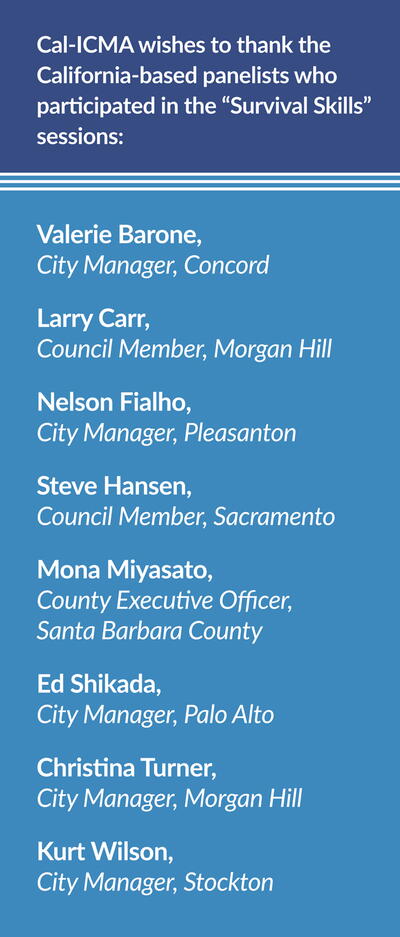
BY KEVIN DUGGAN, ICMA-CM
In 2015, Cal-ICMA undertook a Survival Skills study to determine the issues most challenging to city and county managers in California. Through an online survey (with a response rate of more than 50 percent) and a series of focus groups, Cal-ICMA identified those key issues and prepared a report.1
Since then, Cal-ICMA has undertaken a variety of efforts to create additional resources to help managers deal with the identified issues. These include conference sessions and articles dealing with “outlier” council members and how department head relations affect council-manager relations. Additionally, in conjunction with the City Managers’ Department of the League of California Cities, tools were developed regarding how local manager groups can support new managers and managers in distress.
One key topic identified through the survey and focus groups was the challenge of establishing and maintaining an effective working relationship between managers and their governing boards. While this challenge has multiple components, effective communication with elected officials was a primary theme. It will come as no surprise that city councils and other elected bodies often cite inadequate communication as a primary reason to part ways with their city manager/chief executive.
In response to the Survival Skills report, Cal-ICMA has collaborated with the League of California Cities since 2015 to conduct conference panel discussions on topics intended to help chief administrators and elected officials develop and maintain mutually supportive working relationships. During 2019, the project sponsored two panels. One was directed toward city and county managers at the League’s annual City Managers Conference. The second, directed toward elected officials, was conducted at the League’s Mayors and Council Members Executive Forum. The panels addressed how to develop and maintain effective communication between the chief executive and the governing board.
While it’s a given that effective communication is fundamental to any successful relationship, people have varying expectations in regard to what effective communication “looks like.” If the parties in a relationship do not fully appreciate each other’s expectations for “effective communication,” it’s easy for them to feel that communication has fallen short. In addition, when things appear to be going well, one or both parties can become complacent and less sensitive to the priority of effective communication.
Trust, of course, is the most critical characteristic in a successful relationship, and effective communication is essential for trust. The panels generated the following list of strategies for building effective communication.
Recommended Strategies
1. Always make time for your elected officials. Spending time with your elected officials may not always be the most fulfilling part of your job or seem to be the best use of your time, but nothing is more important. You are the critical link between the governing board and the organization, and this role cannot be ignored or shortchanged. The time you spend allows you to gain important information and insights regarding the thinking of your elected officials. It also demonstrates that you recognize the important role they play as policymakers and that you want to understand their perspective on issues. No one ever ran for public office to feel ignored or unimportant!
2. Develop a clear understanding of your elected officials’ expectations regarding communication. While it’s certainly your intent to be an effective communicator with your elected officials, it’s unlikely you’ll meet that goal if you don’t fully understand their expectations. In addition, what one elected official expects can differ dramatically from what others may expect. Without developing a clear understanding of what’s expected (and consensus among the elected officials to the greatest extent possible), you’ll be shooting in the dark. Sometimes the best approach is simply to ask, either individually or as a group, what effective communication looks like to them.
3. Adjust communication techniques to the needs of individual councilmembers. It’s likely you’ll find a variety of preferences among your elected officials for how much information they wish to receive and methods of communication. Some will want detail, while others will want the CliffsNotes version. Some will want information verbally, others in writing. Some prefer communication in person, others not so much. While these different preferences offer challenges, it’s much easier to deal with this complexity if you at least understand it.
4. Establish a “floor” of information that you make available to all. While it’s important to tailor communications to individual preferences, it’s also important to establish a minimum amount of information (the “floor”) that needs to be provided to the entire council or board even when you provide more detail to those who want it. All elected officials need to be confident that they had access to the same information you provided to others, even if they did not choose to get into the same degree of detail.
5. Be particularly sensitive to how/when to communicate “bad news.” There are few things managers dislike more than having to communicate bad news to their elected officials. This is particularly the case when the bad news involves some form of organizational failure. However, these are the most critical times to communicate clearly, accurately, and quickly. Don’t let the natural anxiety of having to report unwelcome information lead to an undue delay in communicating the information or in “spinning” it in a way that could be perceived as being less than forthright. Most people, including elected officials, are much more likely to forgive an honest mistake than to forgive what appears to them to be a less than open and clear communication of what happened.
6. Develop clear guidelines regarding communication between elected officials and staff. Unless you’ve established clear guidelines governing appropriate protocols for communication between elected officials and staff members, you are certain to have challenges. While clear guidelines are not guaranteed to prevent either elected officials or staff members from communicating inappropriately, having no guidelines will almost assure it.
7. Communicate consistently with all governing board members. Consistency in messaging with individual elected officials is critical. While it may be tempting to agree with whichever elected official you’re speaking with at the moment, varying your message or appearing to take different positions with different members will create inconsistent messaging and will harm your credibility.
8. Reestablish communication expectations whenever the council changes. Changes in the council composition, even if only one or two members, can dramatically affect the council dynamic, including expectations about communication. Never take for granted that what was acceptable to one council will be acceptable to another. Even if your council doesn’t change, members’ expectations can shift over time, so it’s important to reengage your elected officials on the topic periodically.
9. Encourage/promote effective communication among elected officials. No matter how effectively you communicate with your governing board members, your professional life will be a lot easier if they also communicate effectively among themselves. While you don’t have complete control over their interactions, encouraging good communication among elected officials, and being clear about why such communication results in a better working environment for everyone, can help make for a more effective council/staff team.
Don’t forget the basics:
- Exercise patience: Be willing to take the time to carefully listen to what your councilmembers have to say.
- Practice emotional maturity: Keep your cool and don’t overreact to what is said or how it is said—never allow a policy disagreement to appear to become a personal disagreement.
- Listen more than you talk: While this is a cliché, it’s often very difficult to do and requires thoughtful deliberation.
Effective communication is fundamental to an effective manager/elected official relationship. It requires a clear strategy and effective implementation. Remember:
Effective Communication = Trust
Trust = A Successful Relationship.


Endnote
1 Download the report, “Challenges and Strategies: Maximizing Success for City and County Managers in California,” at https://www.icma.org/cal-icma-survival-skills-report.
New, Reduced Membership Dues
A new, reduced dues rate is available for CAOs/ACAOs, along with additional discounts for those in smaller communities, has been implemented. Learn more and be sure to join or renew today!
